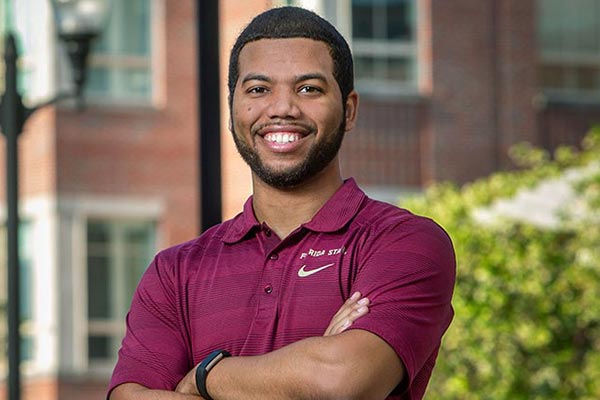Keanan Joyner

"Getting Paid to Learn is Awesome."
College: Arts and Sciences
Degree Program: Clinical Psychology
Degree: Doctorate
Award: Ford Foundation Predoctoral Fellowship (2018)
Why did you choose to attend FSU to pursue a graduate degree?
I was initially drawn to FSU by the breadth of my mentor’s research program and by the collaborative nature of the Psychology department. Additionally, I was highly impressed by all the resources that FSU provides. Just as one example, the grants management office in the Psychology department provides great support for trainees to submit grants and help manage them if they are awarded. I also noticed during my interview how genuinely happy all the graduate students seemed at FSU, which was quite comforting when thinking about where I’d like to spend a large chunk of my 20s. Lastly, the lab environment set up by my mentor was just so positive; everyone got along, was upbeat and collaborative, and did such fantastic science.
What motivated you to pursue a graduate degree?
I really love doing research and want to do it for a long-term career. Getting my PhD serves as a bridge to be able to do research in an academic setting.
Importance of your research and work:
The overall aims of my research are to elucidate etiological and maintaining factors in substance use disorders (SUDs) and to develop improved methods of assessment in this area. From a theoretical standpoint, I am particularly interested in the study of biological and behavioral processes underlying psychopathology. Mental illness broadly, and addiction more specifically, exact enormously high costs on society, and even more importantly, cause suffering for the individual experiencing the psychopathology and their loved ones. My work is important because it seeks to understand preexisting risk factors for psychopathology and improve the efficiency of early identification of these risk factors so we can provide preventative interventions to those at highest risk. As part of this effort, it is important to understand what brain function can and can’t tell us about future psychopathology, so a large portion of my research program concerns the neurophysiological and neurobiological processes implicated in mental illness. Also aiding in this effort, I utilize twin designs (“behavioral genetics”) to help demarcate what operates a liability for different forms of mental illness. My hope is to one day develop efficient screening tools to match individuals with resources and treatment prior to the full onset of symptoms, particularly as it relates to substance use and addiction.
Briefly describe your career aspirations.
I aspire to be an academic researcher in a university setting. I plan to leverage my research passions throughout my career to both advance scientific knowledge on the phenomenon of addiction and increase diversity in academia through sustained mentorship.
Advice for anyone considering graduate school.
My advice is to treat your academic career like you’re starting a small business, and that business is you. This means that you should expect, at times, to work way over forty hours per week to get your business up and running. But, it also means that if you have to work way over forty hours per week every week just to keep your business afloat, maybe you’re not such a great business. That doesn’t always mean you’re incapable of having a great business, but it might be a sign you need to tweak your business strategy to succeed. Don’t work yourself to death; remember that you’re giving up a large chunk of your life to graduate school. Don’t delay life events; get married, find hobbies, get involved in your community. Don’t be miserable and tell yourself, “it’s just a few more years.” Graduate school can be a fantastic ride, but it can also be rough for a lot of people. Throughout my graduate training, the one thing that has always rung true is that “the best grad student is not the smartest one, but the happiest one.” You have to be ready to roll up your sleeves and get to work, but don’t forget just how important it is both to your wellness and your success to also be happy!
Accomplishments during your graduate career that you are proud of.
I am particularly proud that I became the first FSU graduate student in any discipline in almost a decade to receive the prestigious Ford Foundation Predoctoral Fellowship from the National Academy of Sciences, Engineering, and Medicine. I’ve also published over a dozen peer-reviewed articles and received several grants and awards, totaling over $20,000 to date. Lastly, I am particularly proud of the work I’ve been able to do as part of several diversity committees, both here at FSU in the Psychology department and as part of the American Psychological Association Division 50’s Collaborative Perspectives on Addiction Conference Diversity Committee.
